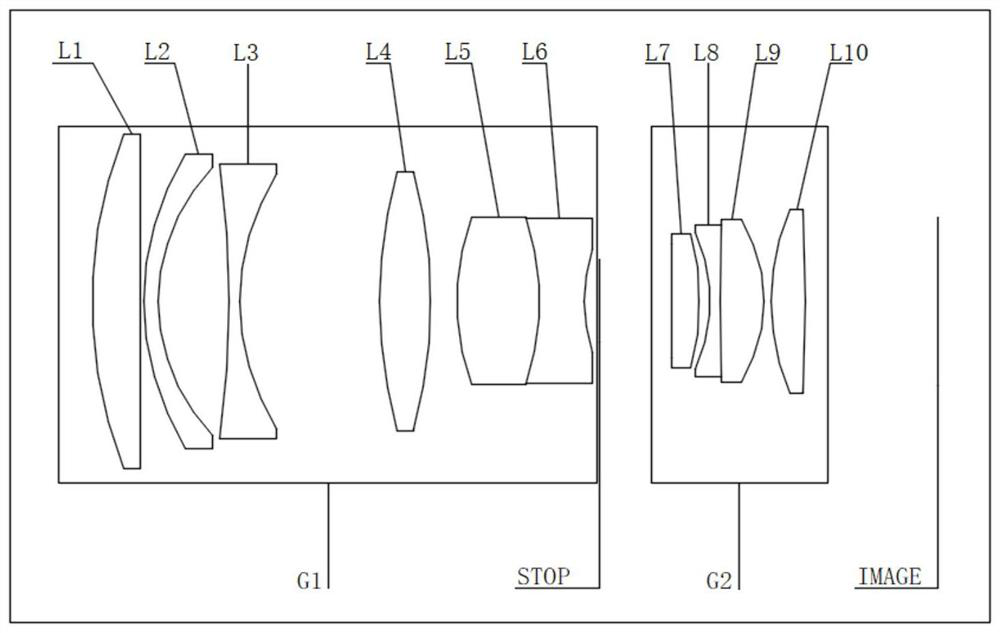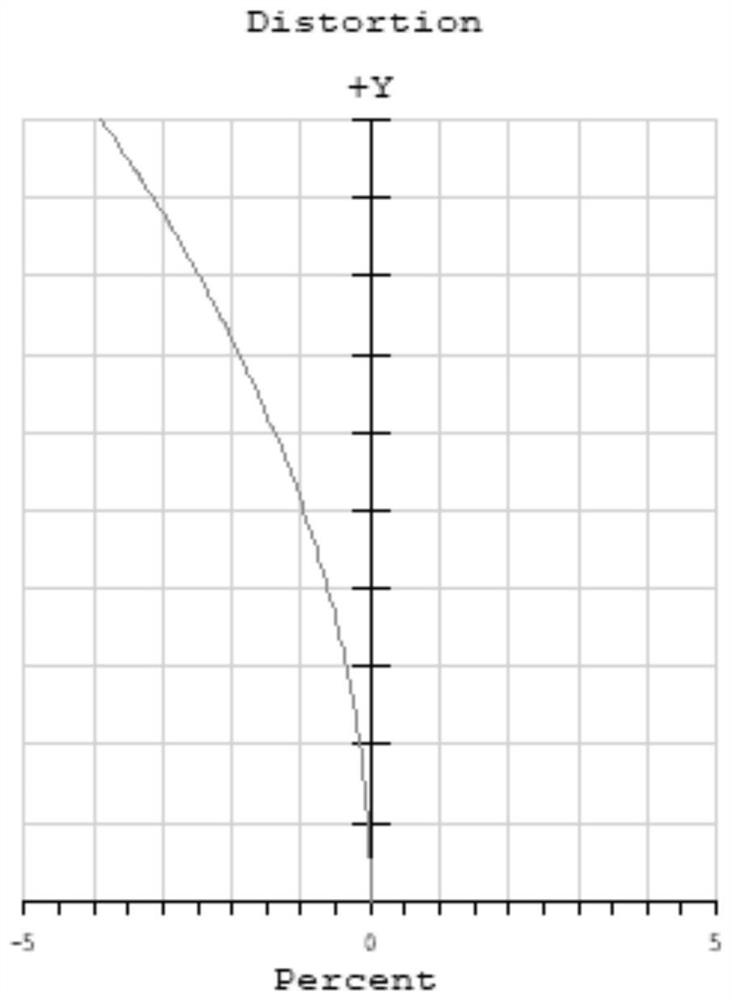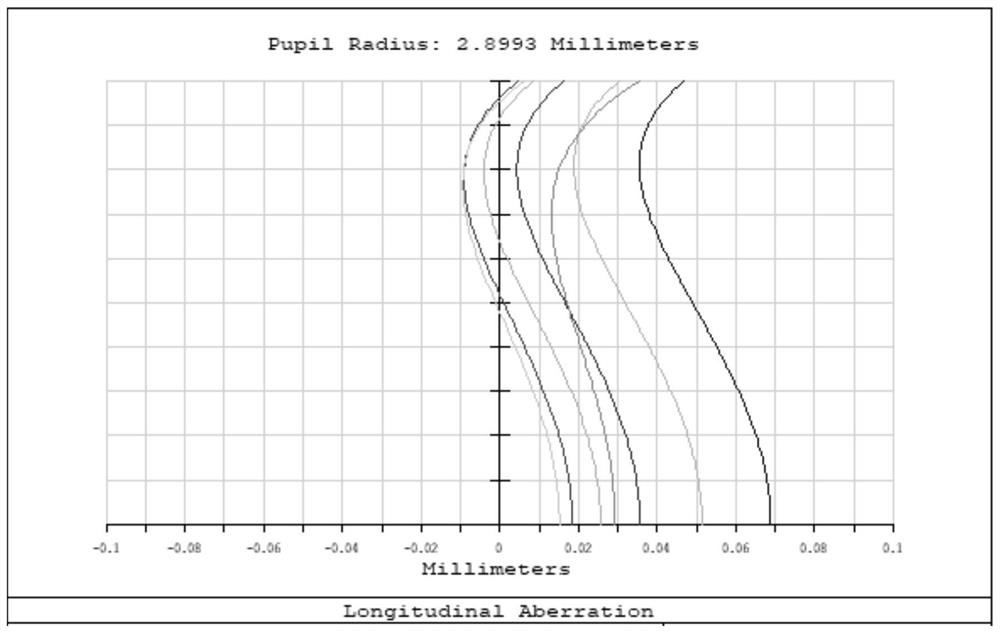Imaging lens
An imaging lens and lens technology, applied in the field of imaging lenses, can solve the problems of small optical magnification, large distortion, and small range of working object distance, etc., to reduce tolerance sensitivity, reduce field curvature and astigmatism, improve The effect of image quality
- Summary
- Abstract
- Description
- Claims
- Application Information
AI Technical Summary
Problems solved by technology
Method used
Image
Examples
Embodiment approach 1
[0067] figure 1 is a schematic diagram showing the structure of the imaging lens according to Embodiment 1 of the present invention.
[0068] The total length of the optical system in Embodiment 1 is TTL=48.581mm, the focal length of the system is f=13.5mm, and the F-number FNO=1.4.
[0069] The following table 2 lists the relevant parameters of each lens of the present embodiment, including surface type, radius of curvature, thickness, refractive index of material, Abbe number:
[0070]
[0071]
[0072] Table 2
[0073] combine figure 1 As shown, in this embodiment, the first lens group G1 includes 6 lenses (L1-L6), wherein the lens L5 and the lens L6 form a doublet lens. The second lens group G2 includes 4 lenses (L7-L10), wherein the lens L8 and the lens L9 are doublet lenses. The refractive index ND and Abbe number VD of the fourth lens in the first lens group G1 are 1.90 and 23.5, respectively. The refractive index ND2 and Abbe number VD2 of the third lens in ...
Embodiment approach 2
[0076] Image 6 is a schematic diagram showing the structure of the imaging lens according to Embodiment 2 of the present invention.
[0077] The total length of the optical system in Embodiment 2 is TTL=45.08mm, the focal length of the system is f=14mm, and the F-number FNO=2.0.
[0078] The following table 3 lists the relevant parameters of each lens of this embodiment, including surface type, radius of curvature, thickness, refractive index of material, Abbe number:
[0079]
[0080]
[0081] table 3
[0082] combine Image 6 As shown, in this embodiment, the first lens group G1 includes five lenses (L1-L5), wherein the lenses L4 and L5 are doublet lenses. The second lens group G2 includes 4 lenses (L6-L9), wherein the lens L7 and the lens L8 are doublet lenses. The refractive index ND and Abbe number VD of the third lens in the first lens group G1 are 1.98 and 16.5, respectively. The refractive index ND2 and Abbe number VD2 of the third lens in the second lens g...
Embodiment approach 3
[0085] Figure 11 is a schematic diagram showing the structure of the imaging lens according to Embodiment 3 of the present invention.
[0086] The total length of the optical system in Embodiment 3 is TTL=53.565 mm, the focal length of the system is f=18.49 mm, and the F-number FNO=1.8.
[0087] The following table 4 lists the relevant parameters of each lens of this embodiment, including surface type, radius of curvature, thickness, refractive index of material, Abbe number:
[0088]
[0089]
[0090] Table 4
[0091] combine Figure 11 As shown, in this embodiment, the first lens group G1 includes 6 lenses (L1-L6), wherein the lens L5 and the lens L6 form a doublet lens. The second lens group G2 includes 4 lenses (L7-L10), wherein the lens L8 and the lens L9 are doublet lenses. The refractive index ND and Abbe number VD of the fourth lens in the first lens group G1 are 1.85 and 24.2, respectively. The refractive index ND2 and Abbe number VD2 of the third lens in ...
PUM
 Login to View More
Login to View More Abstract
Description
Claims
Application Information
 Login to View More
Login to View More - R&D
- Intellectual Property
- Life Sciences
- Materials
- Tech Scout
- Unparalleled Data Quality
- Higher Quality Content
- 60% Fewer Hallucinations
Browse by: Latest US Patents, China's latest patents, Technical Efficacy Thesaurus, Application Domain, Technology Topic, Popular Technical Reports.
© 2025 PatSnap. All rights reserved.Legal|Privacy policy|Modern Slavery Act Transparency Statement|Sitemap|About US| Contact US: help@patsnap.com



